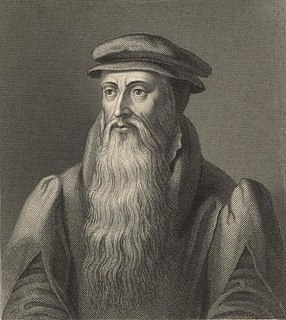A Quote by Joseph Hall
The idle man is the Devil's cushion, on which he taketh his free ease: who, as he is uncapable of any good, so he is fitly disposed for all evil motions.
Related Quotes
The Devil' is, historically, the God of any people that one personally dislikes... This serpent, SATAN, is not the enemy of Man, but He who made Gods of our race, knowing Good and Evil; He bade 'Know Thyself!' and taught Initiation. He is 'The Devil' of the Book of Thoth, and His emblem is BAPHOMET, the Androgyne who is the hieroglyph of arcane perfection... He is therefore Life, and Love.
As no good is done, or spoken, or thought by any man without the assistance of God, working in and with those that believe in him, so there is no evil done, or spoken, or thought without the assistance of the devil, who worketh with strong though secret power in the children of unbelief. All the works of our evil nature are the work of the devil.
Man is man because he is free to operate within a framework of his destiny. He is free to deliberate, to make decisions, and to choose between alternatives. He is distinguished from animals by his freedom to do evil or to do good and to walk the high road of beauty or tread the low road of ugly degeneracy.
The general consent of all that sect is that God (by his foreknowledge, counsel, and wisdom) has no assured election, neither yet any certain reprobation, but that every man may elect or reprobate himself by his own free will, which he has (say they) to do good or evil ... [All these things are] forged by their own brains, and polished by the finest of their wits, when yet in very deed they are but the rotten heresies of ... Pelagius, long ago confuted by Augustine.
... when death has been brought upon a saint, we ought not to think that an evil has happened to him but a thing indifferent; which is an evil to a wicked man, while to the good it is rest and freedom from evils. 'For death is rest to a man whose way is hidden' (Job 3:23 LXX). And so a good man does not suffer any loss from it.
The error of the ignorant goes so far as to say that God's power is insufficient, because he has given to this Universe the properties which they imagine cause these great evils, and which do not help all evil-disposed persons to obtain the evil which they seek, and to bring their evil souls to the aim of their desires, though these, as we have shown, are really without limit.
It is indeed a matter of great difficulty to discover, and effectually to distinguish, the true motions of particular bodies from the apparent; because the parts of that immovable space, in which those motions are performed, do by no means come under the observation of our senses. Yet the thing is not altogether desperate; for we have some arguments to guide us, partly from the apparent motions, which are the differences of the true motions; partly from the forces, which are the causes and effects of the true motions.
To free a man from suffering, he must be set right, put in health; and the health at the root of man's being, his rightness, is to be free from wrongness, that is, from sin. A man is right when there is no wrong in him. I do not mean set free from the sins he has done: that will follow; I mean the sins he is doing, or is capable of doing; the sins in his being which spoil his nature — the wrongness in him — the evil he consents to; the sin he is, which makes him do the sin he does.





































